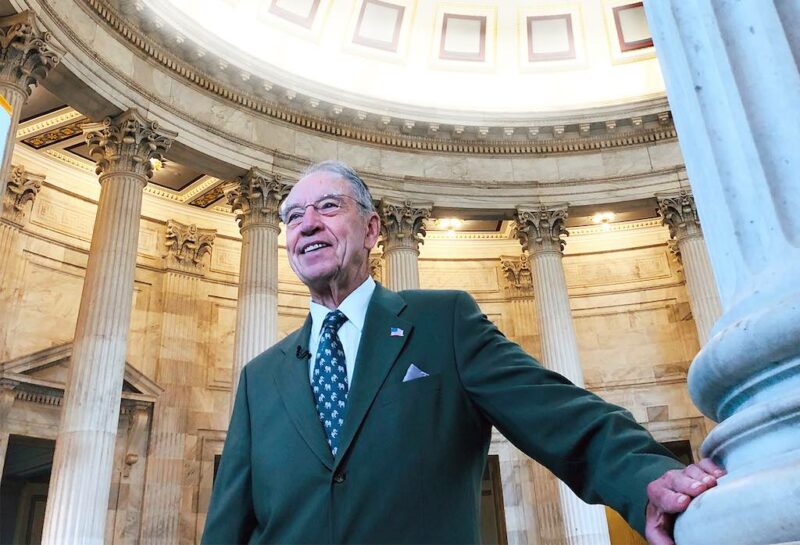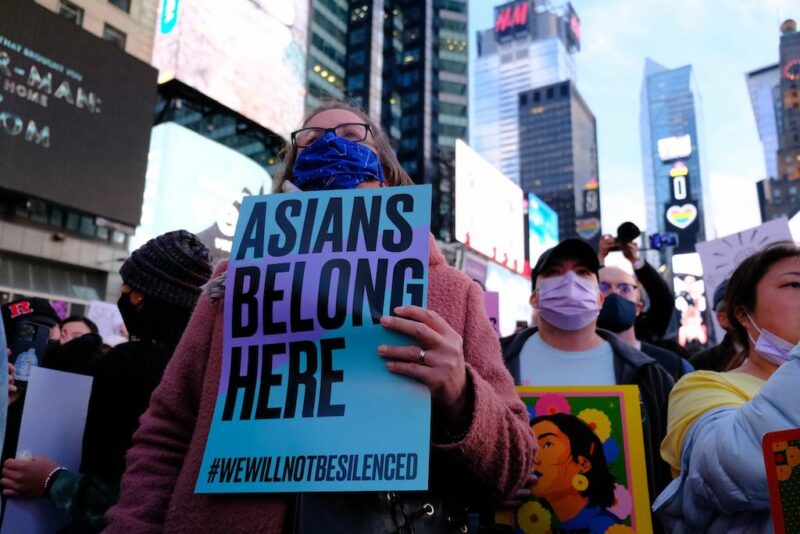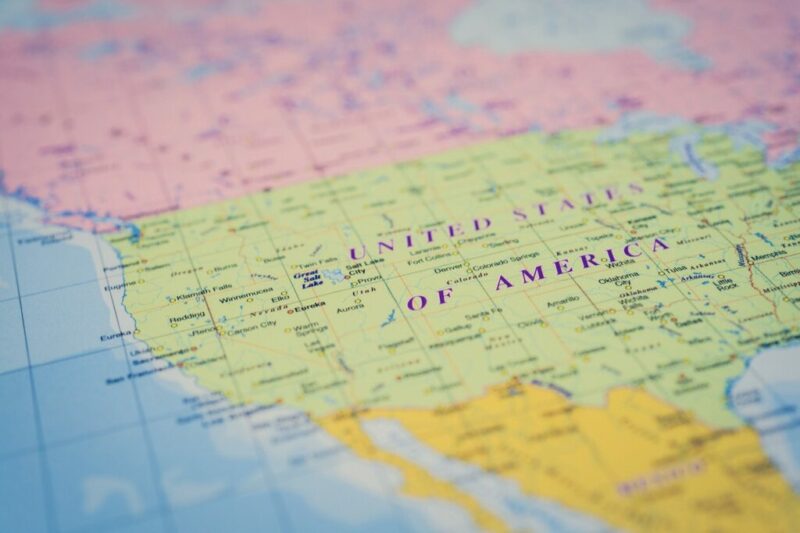New York State recently approved the establishment of an Asian Affairs Committee, serving as a bridge between the state government and the Asian American community, with a focus on enhancing the safety, health, economic well-being, education, and civic engagement of the Asian community. The responsibilities of the Asian Affairs Committee typically include:
- Monitoring and reporting on discrimination and inequality issues faced by Asian Americans.
- Advocating for the rights and interests of Asian Americans.
- Providing resources and services to help Asian Americans integrate into American society.
Currently, in addition to the federal government, 15 states have set up similar advisory bodies.
In the 2020 census, the United States had 18.43 million Asian Americans, accounting for approximately 7% of the national population. The Pew Research Center predicts that by 2055, Asians will surpass Hispanics to become the largest immigrant group in the United States, and by 2060, the Asian population in the United States will reach 46 million.
The U.S. Department of Health and Human Services
President’s Advisory Commission on Asian Americans, Native Hawaiians, and Pacific Islanders
Established in May 2021 through Executive Order 14031 by President Joe Biden, this commission operates within the Department of Health and Human Services and consists of 25 appointed leaders. Its mission includes:
- Overseeing and coordinating the efforts of federal agencies to advise the President on promoting fairness, justice, and opportunities for Asian Americans (AA), Native Hawaiians, and Pacific Islanders (NHPI).
- Addressing anti-Asian bias, xenophobia, racism, ending nativist policies, and enhancing inclusivity, belonging, and public awareness of the diversity and achievements of AA and NHPI people, cultures, and histories.
- Developing policies, plans, and measures to prevent, report, respond to, and track anti-Asian hate crimes and hate incidents.
- Enhancing the capacity and contributions of AA and NHPI communities through fair federal funding, grants, and employment opportunities.
- Improving policies and practices related to research and equitable data classification about AA and NHPI communities.
- Enhancing policies and practices for language access services to ensure that AA and NHPI communities can access federal programs and services.
- Strengthening strategies for public and private sector collaboration and community engagement to improve the safety and socio-economic, health, education, occupational, and environmental well-being of AA and NHPI communities.
The United States Congress
Congressional Asian Pacific American Caucus (CAPAC)
Established in 1994, CAPAC is composed of Asian American and Pacific Islander (AAPI) members of Congress and those dedicated to promoting the well-being of AAPI communities. Its tasks include:
- Ensuring that legislation passed by the U.S. Congress maximizes AAPI participation and reflects the concerns and needs of the AAPI community.
- Educating other members of Congress about AAPI history, contributions, and concerns.
- Collaborating with other legislators to protect and promote the civil and constitutional rights of all Americans.
- Formulating policies on legislation and issues related to citizens, residents, or AAPI individuals in the U.S. and its territories and possessions.
- Coordinating the efforts of AAPI members of Congress and enhancing their capacity to achieve these goals.
15 states that have established Asian affairs agencies
California - The Golden State
California Asian American & Pacific Islander Legislative Caucus (AAPILC)
AAPILC, also known as APILC, was established in 2001 with the approval of then-Speaker Robert Hertzberg and was initially chaired by former state legislator George Nakano.
Their responsibilities include:
- Increasing the representation of Asian and Pacific Islander Americans (APIA) in various levels of government.
- Ensuring that APIA communities have equal access to education, social services, healthcare, mental health, and other government programs and services.
- Maintaining a safety net of health, mental health, and social service programs for the APIA community.
- Ensuring language access and culturally competent services in government programs.
- Strengthening protection against hate crimes and defending the rights and freedoms of APIA citizens.
- Countering racial stereotypes and negative portrayals of APIA in the media.
- Promoting greater civic engagement and understanding of major policy issues within the APIA community.
- Building common interests and communication among various APIA communities.
California Commission on Asian and Pacific Islander American Affairs (CAPIAA)
In 2002, the first chair of APILC, George Nakano, and members of APILC jointly drafted AB 116 legislation, which established CAPIAA.
CAPIAA enhances the visibility of Asian and Pacific Islander American communities in political, economic, and social discussions by assisting and strengthening the state government's response to the diverse and complex issues facing these groups.
Connecticut - The Constitution State
Asian Pacific-American Affairs Sub Commission (CWCSEO)
Within the Connecticut General Assembly's Committee on Children, Women, the Elderly, Fairness, and Opportunity (CWCSEO), there are seven sub-commissions, one of which is dedicated to Asian Pacific-American Affairs. This sub-commission informs policymakers about the needs of Asian Pacific-American communities, employing data-driven, cross-cultural policy innovation to eliminate disparities through identifying opportunities, building connections, and driving change.
Their responsibilities include:
- Promoting best practices and advocating for sound public policies.
- Providing a trusted source of information.
- Breaking down barriers, bridging communities, and fostering opportunities.
- Working to create a fairer and more accessible nation for all residents and future generations.
Illinois - The Land of Lincoln
Asian American Advisory Council
This council operates under the Illinois Department of Children and Family Services (DCFS) and has the overall goal of providing consultation and advice to department leadership regarding services provided to Asian and Asian American clients, as well as addressing any issues related to Asian American employees of the department or those applying for positions within the department.
Asian American Family Commission
The purpose of this commission is to provide recommendations to the Governor and the General Assembly and to collaborate directly with state agencies to improve and expand existing policies, services, programs, and opportunities for Asian American families in Illinois. Their primary responsibilities include:
- Overseeing and reviewing existing and proposed legislation and programs aimed at meeting the needs of Asian Americans in Illinois.
- Assisting state agencies in developing strategies for expanding and enhancing the social and economic well-being of Asian American children and families.
- Facilitating the participation of Asian Americans and representation of their interests in the formulation, implementation, and planning of policies, programs, and services.
- Promoting research to document the impact of policies and programs on Asian American families, including the use of existing reports, studies, and planning work, as well as programs and initiatives.
South Asian American Advisory Council, Illinois
The purpose of this council is to provide advice to the Governor and the General Assembly on policy issues affecting South Asian Americans and immigrants, promote the role and civic engagement of South Asian Americans in the state, and collaborate with state agencies and committees to establish relationships with and disseminate information to the South Asian American and immigrant communities throughout the state.
Iowa - The Hawkeye State
Commission of Asian and Pacific Islander Affairs
Established in 2004, this commission consists of 7 members appointed by the Governor and is responsible for addressing issues and needs faced by Asian and Pacific Islander (API) communities in the state. It provides advice to the Governor, Lieutenant Governor, as well as the state legislature and agencies, and serves as a policy guidance body to enact necessary administrative and legislative reforms to ensure that APIs have access to the benefits and services offered by the state. Its responsibilities include:
- Researching opportunities and evolving needs of APIs in the state of Iowa.
- Serving as a liaison between the office and the public, sharing information, and gathering input from constituents.
- Advising the Governor and the General Assembly on legislative and administrative actions.
- Discretionary establishment of advisory committees, workgroups, or other alliances as needed.
Maryland - The Old Line State
Governor's Commission on Asian Pacific American Affairs
Established by the Governor in June 1992, initially known as the Governor's Advisory Committee on Asian-Pacific American Affairs, the commission changed its name to the current one in July 1999.
This commission provides advice to the Governor and the Office of Asian Pacific American Affairs on issues affecting Asian Pacific American communities in Maryland, including matters related to economic, workforce, and business development.
Massachusetts - The Bay State
Asian American & Pacific Islanders Commission (AAPIC)
Originally established on October 29, 2006, as the Massachusetts Asian American Commission (AAC), Governor Charlie Baker signed legislation renaming it as the Massachusetts Asian American & Pacific Islanders Commission (AAPIC) on July 16, 2021.
The commission's responsibilities include:
- Recognizing and highlighting the significant contributions of Asian American and Pacific Islander communities to the cultural, economic, and political life of the Commonwealth.
- Identifying and addressing the needs and challenges faced by Asian Pacific Islander residents.
- Promoting the well-being of this vibrant and diverse community, thereby advancing the interests of all who call Massachusetts home.
Michigan - The Great Lakes State
Michigan Asian Pacific American Affairs Commission (MAPAAC)
In 2005, Governor Jennifer Granholm established the Governor's Advisory Council on Asian Pacific American Affairs (ACAPAA) through an executive order within the Michigan Department of Civil Rights. ACAPAA was tasked with advising the Governor and the Department of Civil Rights on policy issues related to Asian and Pacific Islander Americans (APA) in Michigan.
In 2009, Governor Granholm transferred the powers and duties of ACAPAA to the Michigan Asian Pacific American Affairs Commission (MAPAAC) through Executive Order 2009-21, effectively abolishing the advisory council and creating the current commission. Its mission is to promote the full and equal participation of Asian Pacific American communities in building the great state of Michigan. MAPAAC aims to serve as a model commission by adding public value to Michigan and the APA community through active engagement.
Minnesota - The North Star State
Council on Asian Pacific Minnesotans
This council is dedicated to advocating for economic, social, legal, and political equality for Asian Pacific Islanders (API) in Minnesota and contributing to the well-being of the API community. It serves as a liaison and advisory body between the state government and the API communities in Minnesota. Its responsibilities include:
- Engaging with diverse API communities to understand and advocate for their needs.
- Strategically engaging with API communities to build and maintain strong and diverse partnerships.
- Cultivating the ability of API communities to influence public policy and community leadership.
- Helping policymakers understand the nature of issues facing API communities.
- Expanding and deepening the council's capacity to successfully influence public policy.
- Anticipating new trends and issues and leading relevant public policy initiatives.
- Strengthening the council's infrastructure to enhance its ability to fulfill its mission.
New Jersey - The Garden State
Asian American Heritage Commission (AAHC)
On January 18, 2022, Governor Murphy established the Asian American Heritage Commission within the New Jersey Department of Education. One of its primary objectives is to investigate, design, encourage, and promote the implementation of cultural and educational programs related to the Asian or Asian American cultures in the state of New Jersey.
Ohio - The Buckeye State
Ohio Asian American Pacific Islander Advisory Council (OAAPIAC)
Established on September 27, 2007, by the Governor's directive, OAAPIAC aims to promote the rights and well-being of Asian American Pacific Islander (AAPI) communities in Ohio by educating and mobilizing AAPI communities, government agencies, and all stakeholders in Ohio society.
Their primary goals and work include:
- Providing advice, information, and recommendations to the Governor and members of his cabinet on plans and policies addressing AAPI-specific issues in Ohio.
- Advocating for direct AAPI participation in policymaking, planning, and decision-making bodies, enhancing the leadership capacity of AAPI community organizations, and effective outreach efforts.
- Expanding employment opportunities for non-technical AAPI workers, advocating for recruitment and advancement opportunities for AAPI professionals and managers, and promoting AAPI involvement in business leadership.
- Assisting AAPI individuals in obtaining legal residency status, accessing necessary health and public services for adaptation to American life, and becoming productive citizens.
- Facilitating communication and interaction within AAPI communities and between AAPI communities and the broader society in Ohio. Increasing awareness and visibility of AAPI contributions to the socioeconomic and cultural fabric of Ohio.
- Promoting business engagement as a resource to support AAPI mobilization.
Oregon - The Beaver State
Oregon Commission on Asian and Pacific Islander Affairs (OCAPIA)
OCAPIA was first mentioned in legislation in 1995, indicating that it may have been established in that year or earlier.
This commission serves as a policy advisory body to Oregon policymakers and leaders, aiming to:
- Achieve and establish economic, social, legal, educational, health, safety, family stability, environmental, and civic participation equality for Asian and Pacific Islander (API) communities in Oregon.
- Cultivate and develop leaders among APIs at the state level across all branches of government.
- Ensure equal treatment and protection against discrimination.
- Continuously assess the issues and needs faced by APIs, provide services and support, strengthen partnerships between state government and rural and urban communities, and ensure the success of all APIs throughout the state by addressing policy-level issues.
- Incorporate API perspectives into policymaking at the national level.
- Celebrate and educate about the contributions and achievements of Oregon's API communities.
Pennsylvania - The Keystone State
Governor's Advisory Commission on Asian American & Pacific Islander Affairs
The purpose of this commission is to gather the experiences and needs of Asian American and Pacific Islander (AAPI) communities in Pennsylvania. It provides recommendations to the Governor on how best to meet these needs, reviews and assesses programs that impact them, and serves as a conduit for conveying programs and services provided by the Governor and his administration.
South Carolina - The Palmetto State
Asian American and Pacific Islander Affairs Division
The South Carolina General Assembly established the South Carolina Commission for Minority Affairs (CMA) in 1993 to seek federal and other funding for implementing various programs and services for minority communities, including Asian Americans.
Within CMA, the Asian American and Pacific Islander (AAPI) Affairs Division is responsible for reviewing and addressing socio-economic issues affecting the AAPI community in the state. It assists CMA in providing and implementing constructive solutions to support the socio-economic development of the community.
The commission is composed of diverse leaders who can assist individuals seeking language/dialect assistance in languages such as Chinese, Gullah, French, German, Italian, Tagalog, Chavacano, and Hindi.
Virginia - The Old Dominion State
Virginia Asian Advisory Board (VAAB)
Established by law in 2001, VAAB conducts research, gathers information and data, and advises the Governor on issues related to the interests of Asian American and Pacific Islander (AAPI) communities in Virginia. Its focus includes improving economic and cultural connections between the government and AAPI communities, spanning areas such as business and trade, arts and education, and general government affairs. The aim is to ensure that the Virginia state government and the commission can best serve the AAPI population in the state.
Washington - The Evergreen State
Washington State Commission on Asian Pacific American Affairs (CAPAA)
Established on February 26, 1974, by the 43rd Washington State Legislature, the Washington State Commission on Asian Pacific American Affairs was officially created. On April 17, 1995, Governor Mike Lowry signed legislation renaming the commission to include Pacific Islanders, becoming the Washington State Commission on Asian Pacific American Affairs.
The mission of the commission is to improve the lives of Asian Pacific Americans in Washington State by ensuring their participation in opportunities in government, business, education, and other fields. It collaborates with community and state leaders to address concerns and bring about positive change and long-term solutions. This includes ensuring that the state government hears the voice of the community, informing the community about laws and policies that affect their well-being, and advocating for policies and services that support the unique needs of the community.
District of Columbia - The Nation's Capital
Mayor's Office on Asian and Pacific Islander Affairs (MOAPIA)
In the District of Columbia (Washington, D.C.), the highest local authority is the Mayor. Washington, D.C. is the capital of the United States and is not part of any state. It is an independent federal district governed directly by the federal government. Located on the banks of the Potomac River between Maryland and Virginia, its unique political status ensures the independence of the U.S. capital from state governments.
MOAPIA was established in 1987 and has been dedicated to promoting the success and integration of Asian American and Pacific Islander (AAPI) residents and businesses in the District. As the liaison between the Mayor and the AAPI community, MOAPIA connects AAPI residents and businesses with local agencies to facilitate effective partnerships, improve access to services, and overcome language and cultural barriers.
Its key initiatives include:
- Advising the Mayor, Council, and District agencies on the perspectives, needs, and concerns of the AAPI community.
- Providing program funding to AAPI community organizations to deliver culturally and linguistically tailored services and resources to the District's AAPI residents and businesses.
- Advising on and helping coordinate District plans and initiatives that affect the AAPI community, promoting overall well-being, and facilitating interagency efforts within the government.
- Organizing and promoting public and private initiatives related to public safety, human rights, economic development, housing, employment, social services, public health, transportation, education, and multicultural development to ensure an inclusive environment for the District's AAPI community.
Nebraska - The Cornhusker State
On January 27, 2023, State Senator Rita Sanders proposed the establishment of an Asian American Commission in Nebraska. However, it appears that the proposal did not receive significant attention or support at the time.
Disclosure: We are an Amazon Associate. Some links on this website are affiliate links, which means we may earn a commission or receive a referral fee when you sign up or make a purchase through those links.












Leave a Reply